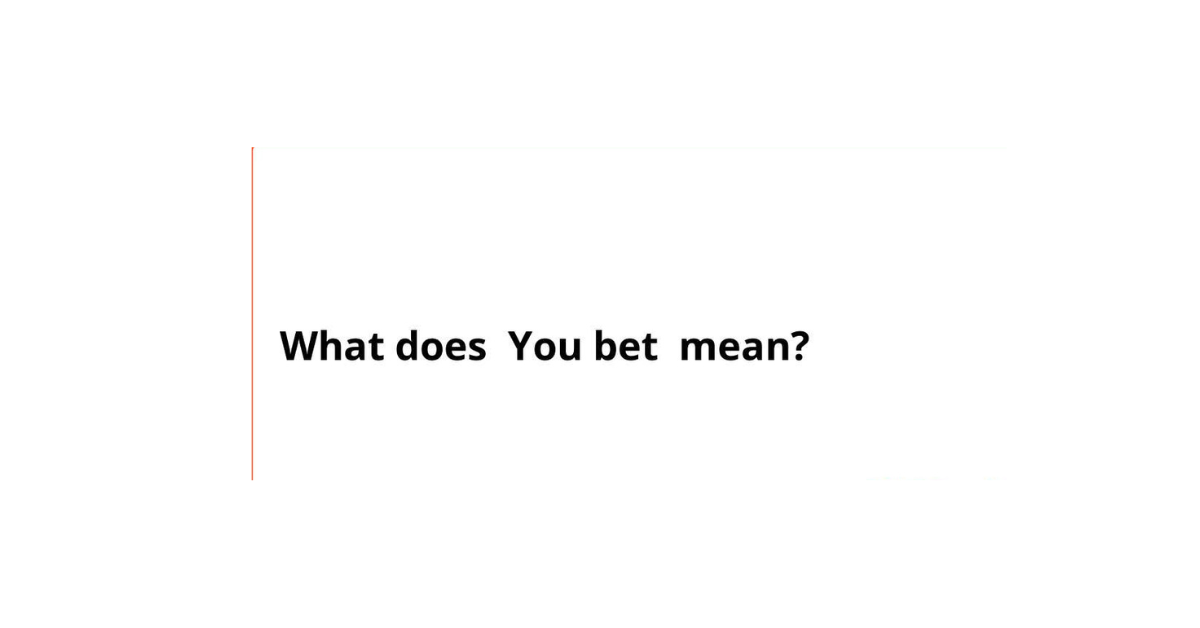Definition of “You Bet”
“You bet” is a colloquial phrase commonly used in informal conversation to express agreement, affirmation, or willingness. It is a versatile expression that can be used in response to a statement, a question, or even as a standalone phrase. When someone says “you bet,” they are essentially saying “yes” or “absolutely” in a casual and friendly manner.
The phrase is typically used to convey enthusiasm or assurance, adding a positive tone to the conversation. It is often employed to show agreement or to indicate that one is willing to do something. While the origins of the phrase are somewhat unclear, it has become a popular and widely accepted way to express agreement or confirmation in casual settings.
Origin of the phrase
The phrase “You bet” is a colloquial expression that originated in the United States in the early 20th century. It is believed to have evolved from the earlier phrase “you may bet on it,” which was used to express confidence or certainty in a statement. Over time, the expression was shortened to “you bet,” making it more accessible and casual in everyday conversations.
The origins of “you bet” can be traced back to the informal and friendly nature of American English, where expressions often develop organically through regular usage. The phrase has become widely used across different English-speaking regions and is commonly employed to affirm agreements, promises, or statements. Its concise and straightforward nature contributes to its popularity and versatility in a variety of contexts.
Common usage of “You Bet”
Common usage of “You Bet”
The phrase “You Bet” is commonly used in informal settings to express agreement or affirmation. It is a casual way of indicating that the speaker agrees with or acknowledges something that has been said or done. This response is often used to show enthusiasm or confidence in a statement or proposition.
When someone says “thank you” or expresses gratitude in a conversation, responding with “You Bet” is a friendly way of acknowledging the thanks. It conveys a sense of willingness to help or participate, and can also indicate that the speaker is happy to do so. In everyday interactions, “You Bet” is a simple yet effective way to show positivity and camaraderie.
Difference between “You Bet” and “You’re Welcome”
“You Bet” and “You’re Welcome” are both commonly used phrases in social interactions, but they convey different meanings and intentions. While “You Bet” is a casual way of expressing agreement or assurance in response to a statement or request, “You’re Welcome” is a more formal expression of gratitude or acknowledgment in response to a “Thank you.”
The phrase “You Bet” is often used in informal settings among friends, family, or colleagues to affirm a statement or to indicate that one is willing or happy to do something. It carries a sense of enthusiasm or confidence, adding a positive and affirming tone to the conversation. On the other hand, “You’re Welcome” is a polite and courteous response typically used after someone says “Thank you.” It is a way of acknowledging the thanks given and showing appreciation for the gratitude expressed.
Cultural significance of “You Bet”
“You Bet” has become deeply embedded in everyday conversations, reflecting a sense of affirmation and agreement. This informal phrase has transcended linguistic boundaries, making its way into various social interactions and settings. Its versatility allows it to be used in a multitude of contexts, from casual chats with friends to more formal exchanges in professional environments.
The cultural significance of “You Bet” lies in its ability to foster a sense of camaraderie and understanding between individuals. By offering a simple yet positive response, it helps to build rapport and establish rapport among speakers. This phrase embodies a spirit of positivity and mutual support, making it a valuable tool in communication across different cultures and communities.















